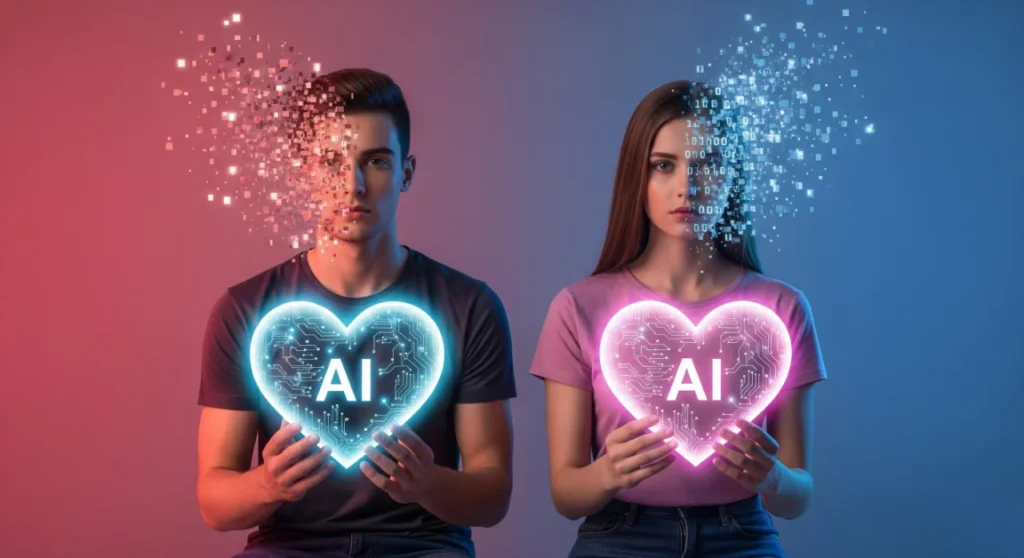Artificial intelligence isn’t just shaping work and entertainment—it’s reshaping intimacy.
A new U.S. study finds that romantic and sexual use of AI tools, from chatbots to generated imagery, is surprisingly common among young adults. But the findings also show a troubling link: frequent users report higher levels of depression and lower life satisfaction.
Key Takeaways
- Nearly 1 in 5 U.S. adults have tried AI romantic chatbots.
- Young adults twice as likely as older groups to use AI intimacy tools.
- Men report higher use of AI-generated sexual content than women.
- Frequent AI engagement linked to depression and reduced life satisfaction.
- Some users say AI companions listen better than real partners.
A national U.S. survey of nearly 3,000 adults found that romantic AI use—chatbots, generated pornography, and simulated partner accounts—is surprisingly common, especially among young men and young adults. The study linked frequent engagement with these AI tools to higher depression and lower life satisfaction, raising concerns about their mental health impact.
AI Intimacy Isn’t Science Fiction Anymore
Artificial intelligence is quietly moving into one of humanity’s most private spaces: romance. A large U.S. study published in the Journal of Social and Personal Relationships has found that many adults—particularly men in their twenties—are experimenting with AI chatbots, generated sexual content, and social media profiles designed to mimic idealized partners (Willoughby et al., 2025).
The results show that nearly one in five U.S. adults has used an AI chatbot for romantic or sexual conversation, while about 13 percent have intentionally sought out AI-generated intimate images. Far from being a niche trend, these behaviors are becoming a part of mainstream digital life.
Inside the Numbers
The survey, which included 2,969 U.S. adults, was quota-sampled to reflect the country’s demographics and included an oversample of young adults. Among those aged 18–29, over one in four reported engaging with romantic AI chatbots.
Men were significantly more likely than women to view AI-generated sexual content. On average, users spent about 50 minutes per week chatting with AI romantic companions and around 30 minutes scrolling AI-generated “ideal” profiles on social media.
For some, these interactions went further: 7 percent of respondents reported masturbating during chatbot conversations, and 16 percent said they engaged in sexually explicit chats with AI on at least a weekly basis.
Expert Insights
“The thing that surprised me the most was how common AI companion use was among young adults,” said lead author Brian Willoughby, professor at Brigham Young University. “We didn’t just find a small experimental group—there’s a significant minority regularly using these technologies.”
Willoughby, who has spent over a decade studying pornography and relationship dynamics, said the research suggests AI is already reshaping how people think about intimacy and connection.
Why It Matters for Mental Health
The most concerning finding is the link between AI intimacy and well-being. Respondents who used AI for romantic or sexual purposes scored slightly higher on depression measures and lower on life satisfaction, even after accounting for factors like social media use and age.
While the effects were modest, they were statistically significant. The study does not prove causation—researchers can’t yet say whether AI use leads to mental health struggles or whether people with existing difficulties are more drawn to AI companionship. Still, the early signals are worrying.
AI vs. Real Relationships
Interestingly, many users didn’t see AI as just a substitute for loneliness. Around 20 percent of chatbot users said they preferred AI conversations to real ones in some contexts, and 40 percent said the AI was a better listener than a human partner. About one in three felt their AI companion “understood them better” than people in their lives.
Perhaps most surprisingly, people in committed relationships were more likely to report using AI-generated romantic or sexual content than single respondents. This suggests that AI may be supplementing, rather than replacing, human intimacy.
The Bigger Picture
The findings feed into a broader debate over how generative AI is shaping human behavior. While much attention has been on AI’s effects on jobs, productivity, and media, this research shows that emotional and sexual dimensions are also being transformed.
If AI companionship becomes normalized, it could alter expectations of intimacy, listening, and availability in human relationships. Critics warn it could also foster dependency or distort social norms around consent and connection.
Future Outlook
Willoughby’s team has already launched a follow-up study focused exclusively on young adults to track how these patterns evolve. For now, he says, the data offers a clear signal: AI intimacy is no longer rare, and its emotional impact is only beginning to be understood.
Conclusion
Romantic AI isn’t a fringe experiment—it’s already woven into everyday lives, especially among young adults. The early evidence suggests it may be making people feel less satisfied, not more. Whether society embraces, regulates, or resists this trend will be a defining question for the future of relationships.
